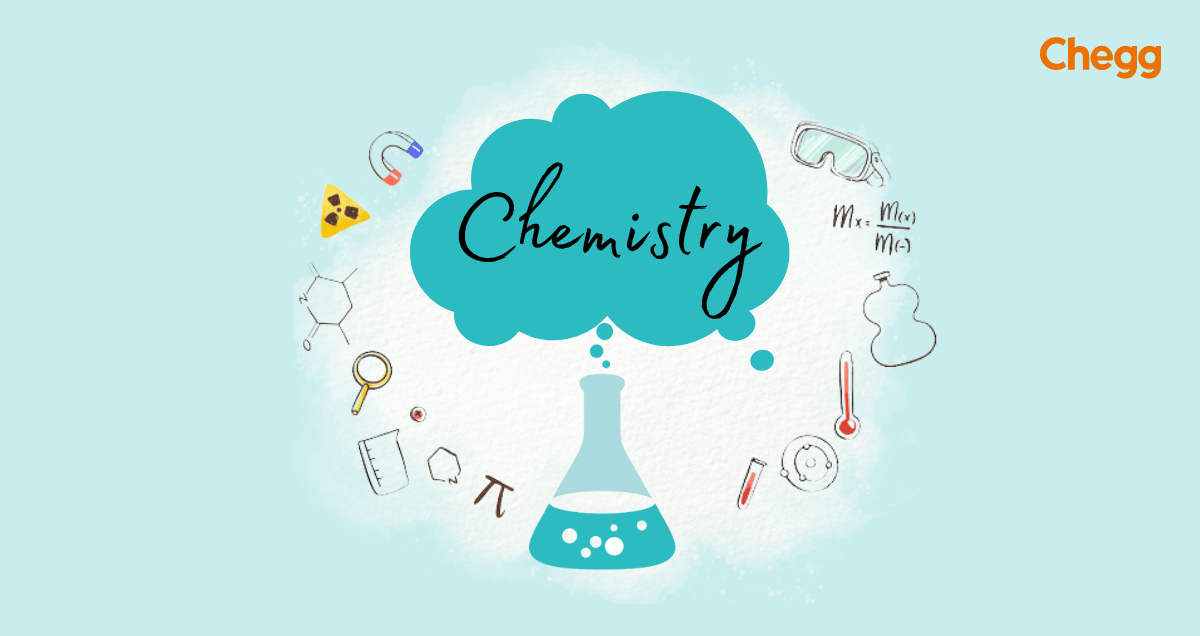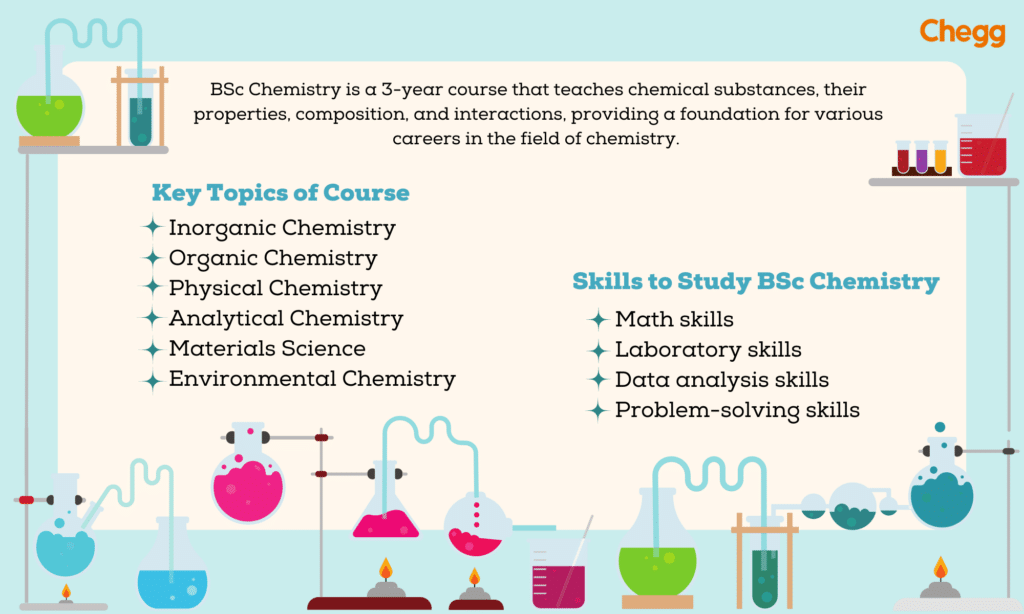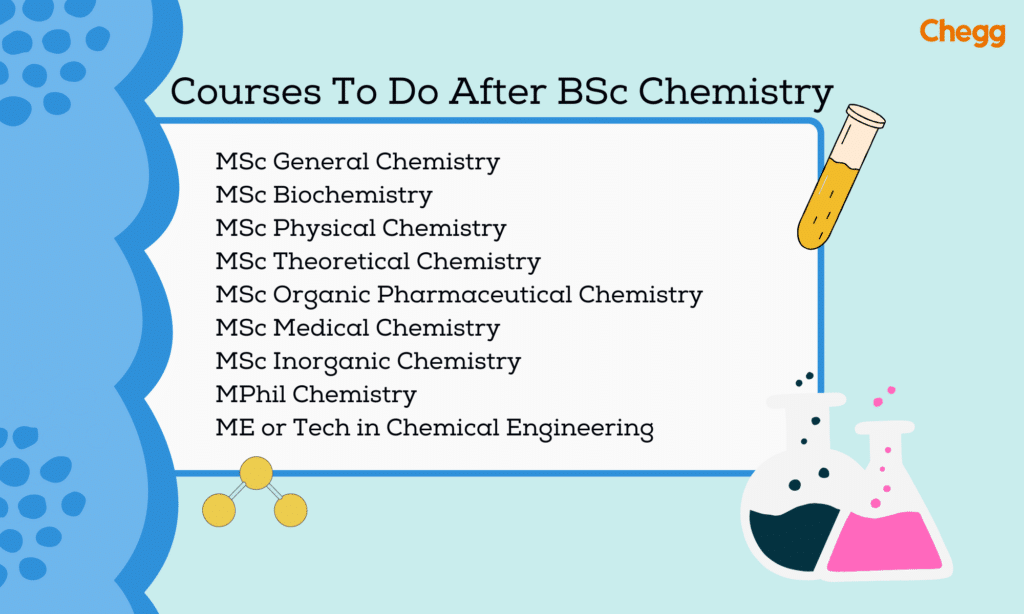

Quick Summary
“Chemistry is a Mystery of Chemicals, Chemists are the Detectives who solve this Mystery.”- Maanyaa Jain
Did the reaction of Sodium to air seem like a mystery to you, or did the existence of liquid metal make you question the general rule of metals? And do you want to uncover all these chemical mysteries?
Then dear reader, BSc Chemistry is the course for you. With subjects like Electrochemistry, Novel Inorganic Solids, Polymer Chemistry and a CAGR growth rate of 9.3% you will be able to learn well and earn better with various BSc Chemistry scope. So, keep reading till the end to know everything about the course.

Recommended Read: Best Career Options After 12th PCM
| 1st-Year Syllabus | |
| 1st Semester |
2nd Semester |
|
|
| 2nd-Year Syllabus | |
|
3rd Semester |
4th Semester |
|
|
| 3rd-Year Syllabus | |
|
5th Semester |
6th Semester |
|
|

| Colleges |
Fees |
|
Hindu College, Delhi. |
INR 61,380 |
|
ST. XAVIER’S COLLEGE, MUMBAI. |
INR 20,507 |
|
Deen Dayal Upadhyay College, Delhi. |
INR 58,035 |
|
Mount Carmel College, Bangalore. |
INR 1.26 lakh |
|
Sacred Heart College, Ernakulam. |
INR 20,910 |
|
Loyola College, Chennai University |
INR 50,000 |
|
Chandigarh University |
INR 1 lakh |
|
Madras Christian College, Chennai University |
INR 60,000 |
|
Jain University, Bangalore |
INR 75,000 |
|
Delhi Technological University (DTU) |
INR 20,000 |
The BSc Chemistry subjects encompass a wide range of topics such as Organic Chemistry, Inorganic Chemistry, Physical Chemistry, and Analytical Chemistry, providing students with a comprehensive understanding of chemical processes and principles.
Worthwhile Reads:
Courses and Career Options After B.Sc. Chemistry
Getting into a BSc Chemistry program involves a few key steps. While the process may vary by college, here’s a general breakdown:
Before applying, make sure you meet the eligibility criteria set by the college or university. Most institutes require you to have studied Science in high school.
Once eligible, register and fill out the application form. Be sure to enter accurate details and upload the necessary documents.
Some colleges require entrance exams for admission. Stay updated on the exams accepted by your target colleges and plan accordingly.
If an entrance exam is required, prepare by studying the syllabus, solving practice papers, and revising key concepts from high school Science.
After the exams, results are announced within a set timeframe. Colleges then release merit lists based on scores and other selection criteria.
Shortlisted candidates may need to attend counseling sessions, where colleges provide details about available courses and seat allotment based on merit.
Once selected, complete document verification, pay the admission fee, and confirm your seat before the deadline.
Following these steps carefully will help you successfully enroll in a BSc Chemistry program at your preferred college.
Becoming Chemical Engineer is a good choice for BSc Chemistry jobs, in this job chemical engineers need to apply their knowledge of chemical processes and principles to design, develop, and optimise production processes, ensuring efficiency, safety, and environmental compliance. They also need to analyse data, conduct experiments, and troubleshoot to improve product quality and reduce costs.
Related Read:
Trending Chemical Engineering Jobs in India
Career in Chemical Engineering
Lab Chemists examine the reactions of different chemicals and develop drugs, cosmetics, and other daily-use products. They also improve the quality of products and methods by developing new products. For this, they often collaborate with research teams and contribute to scientific advancements, while adhering to safety protocols to ensure a productive and efficient laboratory environment. This job role provides great after BSc Chemistry scope to learn and grow in a scientific career.
The primary role of a Biomedical Chemist is to work in basic and applied research for planning and conducting projects. These professionals work as research scientists, clinical research assistants, laboratory administrators, etc. With a strong foundation made during the BSc Chemistry course, they apply their knowledge to solve complex biological problems, optimise drug formulations, and ensure the safety and effectiveness of medical products.
These professionals are chemists who are specifically trained during the BSc Chemistry course to measure, evaluate and check the quality standards in a laboratory. They ensure compliance with all applicable federal standards and regulations and adherence to internal quality guidelines and protocols. Their expertise in chemistry enables them to identify and resolve issues related to product quality, ensuring the delivery of safe and effective products to consumers.
A Product Manager has to build products from existing ideas and help develop new ideas based on industry experience and contact with customers. Their role is to guide R&D, Manufacturing, Marketing, and Sales teams responsible for chemical product line manufacturing. They must also conduct market research, analyse customer needs, collaborate with cross-functional teams, and ensure product quality and regulatory compliance.
Chemistry Lab Technicians are responsible for a wide variety of tasks as they help chemists in the lab. They work in laboratories or facilities and are consistently in contact with various chemicals. Thein knowledge of BSc Chemistry helps them contribute to the advancement of scientific knowledge and aid in the development of new products and processes.
A Medical Technologist is responsible for performing laboratory work. This includes conducting tests on patient specimens to diagnose diseases. The job profile requires immense responsibility as accurate reports should be generated. Their expertise gained from BSc Chemistry course knowledge, enables them to handle advanced instrumentation and techniques, ensuring accurate and reliable results. Medical Technologists also contribute to research and development, quality control, and laboratory management.
R&D Managers research planning and implementing new programs in the company. They also supervise the implementation of new products and programs. Their role involves analysing data, conducting experiments, managing budgets, and ensuring working with regulations. They play a crucial role in driving innovation and contributing to the advancement of scientific knowledge in the field of chemistry.
After completing the BSc Chemistry course one can become Subject Matter Expert and use their knowledge to teach and earn. The role of a subject matter expert is to provide guidance and assistance to students in achieving their career goals.
If you want to become a Subject Matter Expert, then there is no better platform than Chegg India. As Chegg’s Q/A Expert, you will be responsible for solving students’ queries related to Chemistry. The best part about this job is that you can work from anywhere and at any time.
A Forensic Scientist with a BSc in Chemistry is a job that requires scientific knowledge and techniques to analyse physical evidence collected from crime scenes. These scientists use their expertise to identify and evaluate various substances, such as drugs, chemicals, or biological samples. Forensic Scientists play a crucial role in criminal investigations, helping to uncover evidence and contribute to the justice system.
Also Read These:
Career Scope After BSc Forensic Science in India
A Complete Guide to Pursue Career in BSc Radiology
| Job Roles | Skills Required | Average Salary (in INR) |
|
Chemical Engineer |
|
3.1 LPA |
|
Lab Chemist |
|
2.2 LPA |
|
Biomedical Chemist |
|
6.0 LPA |
|
Quality Controller |
|
2.0 LPA |
|
Product Manager |
|
17.0 LPA |
|
Chemistry Lab Technician |
|
2.1 LPA |
|
Medical Technologist |
|
2.5 LPA |
|
Research & Development Manager |
|
14.0 LPA |
|
Subject Matter Expert (Chemistry) |
|
3.2 LPA |
|
Forensic Scientist |
|
4.8 LPA |
Salary Source: Ambition Box, PayScale
Those interested in pursuing a BSc in Chemistry must have a diverse set of skills in order to better understand concepts and improve their educational experience. These skills are essential for both a successful job and academic performance in Chemistry. Participants in the programme get the opportunity to expand their knowledge and skills.
The following is a summary of the most important BSc Chemistry skills needed by the candidates:
Explore About More BSc Branches:
Most In-Demand BSc Courses and High-Paying Jobs
BSc Nautical Science: Scope and Career Path
Best Career Options and Jobs after B.Sc. Biology
BSc Physics-Course Details and Scope in India

BSc in Chemistry is a course for people who want to make a change in a scientific field with the help of chemicals and reactions. And if this interests you then you should positively choose this course. With job roles like Forensic Scientist, Quality Controller, Subject Matter Expert, Project Management etc you will always be learning and making progress in your career.
And for more such interesting & informative articles on courses and career tips visit our Career Advice section right away!
BSc in Chemistry stands for Bachelor of Science in Chemistry. It is a 3-year undergraduate course, it provides foundational knowledge of the multiple elements and aspects of Chemistry. The BSc Chemistry course is one of the most sought-after courses in India.
Yes, a career after BSc in Chemistry is good, as it provides great scope to the candidates. One can choose to do the job in private as well as government sector. There are a variety of job positions in which a BSc Chemistry candidate is required.
BSc Chemistry scope offers a wide variety of job roles to the candidates, you just need to choose the job which interests you and matches your career goals. Some of the best BSc Chemistry job roles are:
1. Product Manager
2. Research & Development Manager
3. Biomedical Chemist
4. Forensic Scientist
5. Subject Matter Expert (Chemistry)
6. Lab Technician
BSc Chemistry is one of the best undergraduate courses. However, some of its topics require additional effort as compared to other subjects. Topics such as Organic Chemistry may be challenging for some. And it would be better if you had a background in maths.
Organic Chemistry is often considered the toughest subject in BSc Chemistry due to its complex concepts, reaction mechanisms, and vast number of reactions that require detailed understanding and memorization.
The job with the highest salary after BSc Chemistry is typically that of a Product Manager in the chemical or pharmaceutical industry, with salaries reaching up to INR 17 LPA or higher. This role involves overseeing the development, marketing, and distribution of chemical products, making it highly rewarding both financially and professionally.
BSc Chemistry includes subjects like Inorganic Chemistry, Organic Chemistry, Physical Chemistry, and Analytical Chemistry. Other topics may include Mathematics, Environmental Science, Industrial Chemistry, and Biochemistry, depending on the university.

Authored by, Amay Mathur | Senior Editor




Amay Mathur is a business news reporter at Chegg.com. He previously worked for PCMag, Business Insider, The Messenger, and ZDNET as a reporter and copyeditor. His areas of coverage encompass tech, business, strategy, finance, and even space. He is a Columbia University graduate.
Editor's Recommendations
Chegg India does not ask for money to offer any opportunity with the company. We request you to be vigilant before sharing your personal and financial information with any third party. Beware of fraudulent activities claiming affiliation with our company and promising monetary rewards or benefits. Chegg India shall not be responsible for any losses resulting from such activities.
Chegg India does not ask for money to offer any opportunity with the company. We request you to be vigilant before sharing your personal and financial information with any third party. Beware of fraudulent activities claiming affiliation with our company and promising monetary rewards or benefits. Chegg India shall not be responsible for any losses resulting from such activities.